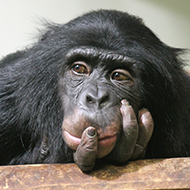Study explores captive primate behaviour over lockdown

Some primate species became more solitary and sedentary during lockdown, while some showed more sexually and physically dominant behaviour.
A study published in Animals has found that captive primates' behaviour changed during lockdown, when visitors were not permitted to enter zoos or safari parks.
Researchers studied four species of primates housed in UK zoos, bonobos, chimpanzees and western lowland gorillas at Twycross Zoo, and olive baboons at Knowsley Safari.
Collecting data from April – September 2020 and November 2020 – January 2021, researchers compared the behaviour of the primates during lockdown to when visitors to the zoo returned.
In the study's introduction, researchers stated that the stimulation caused by zoo visitors has been classed as 'positive, negative or neutral, with animals described as perceiving visitors to be enriching, stressful or showing indifference'.
Primates have been suggested to be particularly sensitive to 'the visitor effect' making them ideal subjects for the study.
Dr Samantha Ward, zoo animal welfare scientist, told The Guardian: “Primates are some of the most cognitively advanced species in zoos and their interactions with visitors are complex.
“A limitation to understanding how visitors can affect behaviour of animals in zoos and parks is that they are rarely close to the public for prolonged periods, so this provided us with a unique opportunity.”
The study found that bonobos and gorillas spend more time alone and more time resting during lockdown, but resumed usual levels of sociability when visitors returned.
In the safari park, the olive baboons performed less sexual and dominant behaviour when visitors returned after lockdown. Alongside this, the olive baboons approached visitor cars more often than they had approached the rangers car during the lockdown period.
When visitors returned, the chimpanzees were found to eat more, and engage more with their enclosures.
Concluding the study, the researchers wrote: “Although it is not possible to accurately state whether the impacts of visitors were positive, negative, or neutral, the behavioural changes observed in the baboons without exponential responses to increased visitors suggests that visitors may have been a stimulant but that there was a threshold after which they were not increasingly stimulated by the visitors.”
“Changes in chimpanzee activity likewise suggested that visitors were a stimulant, whereas the altered enclosure use in gorillas and reduced periods of time spent in solitary by gorillas and bonobos suggests that these species may have been altering activity to reduce the potential overstimulation or stressors experienced during the reopening.
“The opportunity for choice enabled these species to modify their behaviour, and the absence of overt indicators of reduced welfare suggests these species were managing their own experiences in an effective manner.
“Behavioural changes and observed changes in enclosure use highlights the adaptability of zoo species to their environments, including the presence of zoo visitors.”



 The Veterinary Medicines Directorate (VMD) is inviting applications from veterinary students to attend a one-week extramural studies (EMS) placement in July 2026.
The Veterinary Medicines Directorate (VMD) is inviting applications from veterinary students to attend a one-week extramural studies (EMS) placement in July 2026.